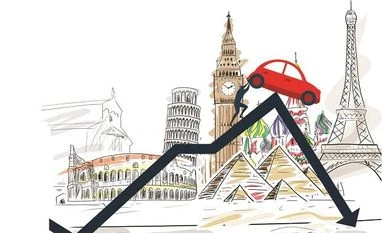The auto sector, which has been affected by the economic slowdown at home, is now facing a double whammy, given the demand concerns in key geographies, such as Europe. Companies with a significant presence in the European market have a seen a steeper fall in their stock prices, as compared to their peers who are largely confined to the domestic market.
Even as the Nifty Auto Index is down by a fifth over the last three weeks, stocks, such as Motherson Sumi, Tata Motors, Varroc Engineering, and Apollo Tyres, are down between 34 per cent and 48 per cent during this period. The sharper fall for these companies is largely because of demand worries in view of the coronavirus pandemic.
An analyst at a domestic brokerage says that fear factor on account of the outbreak would weigh on the demand front, leading to lower volumes and falling utilisation of facilities. Further, supply chain and sales disruption because of the emergency measures taken by Spain, Italy, Hungary, and France, the worst-affected countries in Europe, was a sentiment negative for investors.
The near-term outlook for some of the top European automakers, too, has been muted. Daimler, for example, expects an impact on the supply chain and demand. The company expects sales for Mercedes-Benz cars in 2020 to be below the 2019 level. Renault apprehends the supply chain to be affected given the share of components that come from China’s Hubei province. Nissan Motor is looking at deep cost cuts in its recovery plan. Vehicle sales in China, its second-biggest market, dropped 80 per cent in February because of commuting bans and road closures.
These companies are among the largest clients for Indian auto component makers and Europe is a key market. About 37 per cent of Motherson Sumi’s revenues come from Europe (Spain and Germany), with global operations of European automakers, such as Renault Nissan, Audi, Volkswagen, BMW, and Daimler accounting for about a half of its revenues. Varroc Engineering gets about 46 per cent of its revenues from the European market and counts Fiat Chrysler, Peugeot, Jaguar Land Rover (JLR), and Volkswagen as its customers.
Weak sentiment for Apollo Tyres was on account of the warning by the Hungarian premier about the dent to that economy because of the pandemic. Apollo’s greenfield plant in Hungary was stabilising and analysts had expected it to contribute to mid-single-digit growth for the company’s European operations going ahead. Growth could slow down instead of improving for the company. Another tyremaker, Balkrishna Tyres, would also be affected given that about half of its exports of off-the-road tyres come from the European market. Mahindra CIE, in which Spain’s CIE Automotive has a 56 per cent stake, gets over half of its revenues from the European market and will be impacted as clients scale back on production.
For Tata Motors, the impact will be multifold, given that Europe accounts for over 40 per cent of JLR revenues. In view of the sharp 85 per cent decline in car retail sales in February in China, supply chain disruption, and demand drop in other markets, the company has cut its FY20 earnings before interest and taxes (Ebit) by a percentage point, as compared to the earlier guidance of 3 per cent. Given the debt on its balance sheet and investments in JLR, it would be difficult to sustain cash flows, if the demand situation deteriorates.
In addition to Tata Motors, most auto component players with plants in Europe are leveraged. These plants generate single-digit return on capital employed and muted Ebit margins worsened by higher levels of debt, says an analyst. Without new contracts and scaling back of existing orders, higher fixed costs could make the new plants unviable.
Besides the operational worries, valuations for these companies have been higher than long-term averages. This was above the street’s zone of comfort and thus a derating was waiting to happen, he adds.
Given that there is demand destruction, especially for companies with significant overseas exposure, brokerages indicate that investors could look at India-focussed players, such as Hero MotoCorp, given the expected uptick in rural sales, cash on books, dividends, and prudent capital allocation.
Unlock 30+ premium stories daily hand-picked by our editors, across devices on browser and app.
Pick your 5 favourite companies, get a daily email with all news updates on them.
Full access to our intuitive epaper - clip, save, share articles from any device; newspaper archives from 2006.
Preferential invites to Business Standard events.
Curated newsletters on markets, personal finance, policy & politics, start-ups, technology, and more.
)